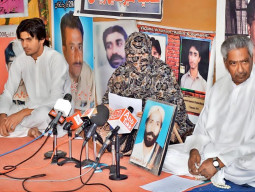
A Supreme Court bench on Thursday observed that the law does not stop the police from booking armed forces officials for their highhandedness.
The two-member bench of the apex court, headed by Justice Jawwad S Kahwaja, is hearing the petition, filed by a woman, Abida Malik, whose husband Tasif Ali went missing on November 23, 2011 from the Sadiqabad police precincts in Rawalpindi.
The Supreme Court Justice Ejaz Afzal Khan has made it clear that Criminal Procedure Code (CrPc) or any other law does not restrict police from registering cases against serving armed forces officers.
During the hearing, Ibrahim Satti, the counsel for Military Intelligence (MI), told the court that the armed forces officials take oath of allegiance to the country and not to defend the constitution.
He also stated that former army chief Pervez Musharraf’s oath was not under the constitution.
Satti said that laws related to the Pakistan Army could be declared as void by the apex court on the basis of fundamental rights. However actions taken by the armed forces were also protected under the constitution. He claimed that armed forces had a special status in the constitution.

Upon this, Justice Khawaja remarked that every citizen had a special status in the constitution and everyone was loyal to the state.
The counsel said that more than 500 suicide attacks were committed in the country.
Justice Jawwad asked: “I want to know who these persons (suicide attackers) are, as I think huge amount is being spent on intelligence agencies in this regard.”
Satti said that these suicide attackers might be the missing persons.
He also referred to the Article 63(1) g, which says that a person would be disqualified from the membership of National or provincial assembly if he criticises the army and higher judiciary in a manner which defames or brings into ridicule the judiciary or the armed forces.
The counsel contended that applications about the missing persons in the commission and SC were ridiculing the Pakistan Army. He also said that armed forces officials were performing duties for the protection of borders.
Upon this, the court told him that they were being paid for performing duties.
Justice Jawwad S Khawaja also said that they were more concerned about the integrity of the Pakistan Army; therefore, they had expressed concern over the United Nations Working Group on Enforced Disappearances in Islamabad, which has raised the figure of missing persons in detention of spy agencies.
Published in The Express Tribune, July 12th, 2013.
COMMENTS (2)
Comments are moderated and generally will be posted if they are on-topic and not abusive.
For more information, please see our Comments FAQ










































Supreme Court inclination is visible in remarks. So where is the due process
Some Questions which need an answer. 1. Supreme Court of Pakistan comsists of 17 Judges, but all the cases pertaing to the Armed Forces of Pakistan are dealt by few Judges repeatedly. Why is that other Judges are not given these cases. 2. Why are cases against Armed Forces entertained on hearsay and not proofs? 3. Why are all the cases are entertained at Supreme Court and then go down the ladder, unlike other criminal cases which goes to the lower courts and then to higher courts? Doesn't the remarks of the Supreme Court acts as direction to lower courts ? Will the lower courts exercise their good sence or follow the inclinations of higher authorities?Does this not deny the investigation process and due process?